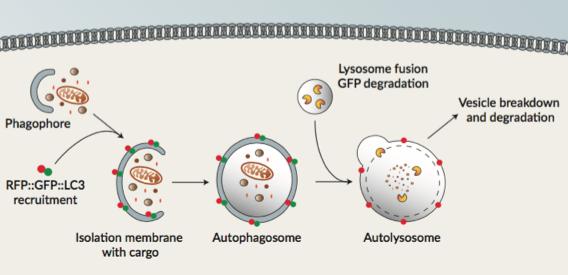Autophagy refers to the process in which your body consumes its own tissue to survive. Your body activates that mode when you are starving for long enough. To many people, the whole process may sound a bit scary, but the truth is that autophagy is your body's natural way to carry out cellular renewal processes. Many experts are of the view that autophagy may help prevent diseases such as cardiomyopathy, cancer, liver disease, diabetes, infections, and many other autoimmune diseases. Autophagy has also been associated with numerous anti-aging benefits that you experience because it destroys damaged components present in spaces within your cells. There has been much talk regarding autophagy and its health benefits, but should you really consider inducing that mode? Let's find out more about it.

Autophagy and Its Health Benefits
Scientists have noticed several autophagy benefits, but they are still looking for clear answers as to how autophagy processes actually work in reality. Here is a bit more about autophagy and its health benefits.
1. It Can Extend Lifespan
Accumulation of damaged cellular components shortens your lifespan by reducing the metabolic efficiency of cells. It is important to understand that autophagy is your body's way to deal with stress by making your cells more resilient. At the same time, autophagy helps to remove dysfunctional mitochondria, which would otherwise produce harmful reactive oxygen species. By preventing these processes, autophagy may help extend your lifespan.
2. It Protects Against Neurodegenerative Disorders
Accumulation of deformed proteins in neurons is one of many reasons you develop neurodegenerative disorders. Those proteins can gradually kill brain cells and affect mental capabilities. By activating autophagy, you can help remove these proteins and protect yourself against many neurodegenerative disorders. In Huntington's disease, there is a buildup of a protein called the Huntingtin (HTT) protein. Similarly, the APP protein creates amyloid that is responsible for causing the Alzheimer's disease. Autophagy may help remove these proteins to protect you against these disorders.
3. It Protects Against Psychiatric Disorders
Natural functioning of autophagy ensures protection against the development of several psychiatric disorders. Any disruption to the processes may increase your risk of developing certain psychiatric conditions such as schizophrenia and depression.
4. It Lowers Risk of Developing Infectious Diseases
Studies have found that autophagy improves your ability to fight infectious diseases. It helps get rid of microbes present inside the cells. At the same time, it removes toxins created by previous infections. It also helps by modulating the immune response to different infections. Studies have shown that autophagy may help remove infectious microbes such as Mycobacterium tuberculosis and viruses such as HIV.
5. It Helps Lowers Inflammation
Interestingly, autophagy can help decrease inflammatory response in the body. It lowers inflammation by removing the cell of antigens that trigger an inflammatory response. What's more, it may remove pro-immune response molecules that are produced after pathogen invasion. By activating autophagy, it is possible to help patients suffering from chronic inflammation and other autoimmune disorders.
6. It Improves Muscle Performance
When you exercise hard in the gym, you put your body and cells under serious stress. With this stress, your energy increases considerably. Over time, it would wear out components faster. However, your body uses autophagy to deal with that response to maintain energy, reduce the need for external energy, and remove degraded cellular components. The whole process would directly help improve overall muscle performance after exercise.
7. It Lowers Risk of Cancer
Some studies have found that autophagy may be involved in lowering risk of cancer. It may be extremely beneficial in slowing down the growth of early-stage cancers. It helps by suppressing processes such as DNA damage response, chronic inflammation, and genome instability. Rodent studies have shown that impaired autophagy is associated with an increased rate of cancer.
How Do You Induce Autophagy?
Learning about autophagy and its health benefits is important, but you may also be wondering if it is really possible to induce that state. Interestingly, you can try different methods here. For instance:
1. Practice Fasting
Fasting may help a lot in inducing autophagy. Intermittent fasting is especially beneficial when done correctly. The idea is to abstain from eating for a short period – it is usually okay to drink water or other liquids like tea or coffee during that period. To reap some amazing benefits, you can try alternate day fasting, where you have to abstain from eating on alternate days, or you can also consider limiting your daily eating window to get the same benefits.
2. Switch to a Ketogenic Diet
Also known as the Keto diet, it involves following a very low carb and high-fat diet. The idea is the same – provide your body with a limited amount of carbs so it starts eating its own tissue to generate energy. During the keto diet, you will be getting about 75% of your calories from fat only – it keeps you from consuming more than 5% of calories from carbohydrates. Doing this would shift metabolic pathways and push your body to start using fat as primary fuel instead of carbs. While on a ketogenic diet, you can opt for foods like olive oil, coconut oil, grass-fed meat, grass-fed butter, avocado, nuts, and seeds.
3. Exercise
Autophagy is activated when your body is under stress and one way to achieve it is through regular exercise. Engaging in strenuous workouts is a good way to put your body under "good stress", which in turn would induce autophagy in the liver, muscle, and adipose tissue. It is important to bear in mind that, at the end of the day, exercise is a form of stress and it is sometimes difficult to figure how much stress is enough to induce autophagy without hurting your body.